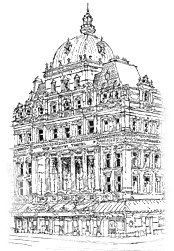
 | The Gallini Family Tree |
| Home | Contact | Statistics | Index |
Opera in London 1790's
 |
Opera in London 1785. Although Italian Opera had been performed since the early 1700's in London, it was in the later part of the century and coincided with the regime at the Kings Theatre of Giovanni Gallini that Opera was transformed in London. Gallini had arrived in London in 1753 and had performed at the Kings Theatre in the 1750's and 1760's. He was later appointed Manager and under his regime the Kings Theatre began to produce performances equal to those of the major Italian opera-houses. To help the audience to understand the plots, most of the London audiences had to rely upon parallel English translations printed on librettos of the period and Gallini hired Mr Molini as an in-house translator. The four seasons between 1785 and 1790 were operatically the best of any during the last two decades of the eighteenth century and London came closer to being pre-eminent in Italian operas since 1720's. No wonder Mozart and Haydn both had hopes of crossing the channel. Gallini sourced many original Italian Operas for London through his agent in Italy, Lord Cowper. Gallini also ensured that performers had been “punctually paid..even in advance” so that the Kings Theatre acquired great Credit and reputation in France and Italy, enabling Gallini to employ the greatest singers and most celebrated dancers that had ever appeared in London. It was at this time that Gallini purchased the Hanover Square concert rooms and assumed the role of manager for both theatres. Although the music performed at both theatres were utterly different and designed to offer audiences an excellent choice, it led to complaints about a conflict of interest, which Gallini acknowledged, however he continued to pursue his regime, as income soared for both theatres. He fought against the vested interested of the powerful figures of the time including the Lord Chancellor and Gallini was described as courageous, even heroic in pursuit of his artistic independence. However, debts which has been accumulated as a result of the rebuilding in 1782 created a series of intrigues between the various investors which resulted in Gallini making an offer to purchase the theatre, with what was described at the time, as a very generous offer. However, he was outbid by Sheriden and Harris who already owned Drury Lane and Covent Garden and hoped to create a grand scheme for profit making by means of monopoly. This was the beginning of seven years of legal battles by Gallini who fought for control of the Kings Theatre years. By the end, Sheriden had bankrupted the theatre in his reckless leveraged buyout and pursuit of his grand scheme but the catastrophic tangle of debts left behind by Sheriden was to haunt Italian opera in London for nearly seventy. After the fire in 1789 which destroyed the Kings Theatre, Gallini gave up any further interest in the Kings Theatre and concentrated his energies solely to the Hanover Rooms. For nearly fifty years, Gallini had led the opera and ballet in London, taught a generation of aristocrats to dance and married one of them, made a substantial fortune as impresario of the chief concert venue in London, and proved to be one of the most successful opera managers of the eighteenth century. If anyone wants to learn more about Gallini's influence on the London Opera then a recommended read would be Italian Opera in Late 18th Century 1789-1795 published by Clarendon Press, Oxford where much of the above material has been drawn. |